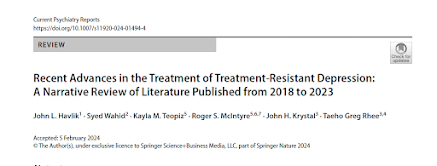Treatment of TRD: New Review Includes ECT
Recent Advances in the Treatment of Treatment-Resistant Depression: A Narrative Review of Literature Published from 2018 to 2023.
Curr Psychiatry Rep. 2024 Feb 22. doi: 10.1007/s11920-024-01494-4. Online ahead of print.PMID: 38386251 Review.

Purpose of review: We review recent advances in the treatment of treatment-resistant depression (TRD), a disorder with very limited treatment options until recently. We examine advances in psychotherapeutic, psychopharmacologic, and interventional psychiatry approaches to treatment of TRD. We also highlight various definitions of TRD in recent scientific literature.
Recent findings: Recent evidence suggests some forms of psychotherapy can be effective as adjunctive treatments for TRD, but not as monotherapies alone. Little recent evidence supports the use of adjunctive non-antidepressant pharmacotherapies such as buprenorphine and antipsychotics for the treatment of TRD; side effects and increased medication discontinuation rates may outweigh the benefits of these adjunctive pharmacotherapies. Finally, a wealth of recent evidence supports the use of interventional approaches such as electroconvulsive therapy, ketamine/esketamine, and transcranial magnetic stimulation for TRD. Recent advances in our understanding of how to treat TRD have largely expanded our knowledge of best practices in, and efficacy of, interventional psychiatric approaches. Recent research has used a variety of TRD definitions for study inclusion criteria; research on TRD should adhere to inclusion criteria based on internationally defined guidelines for more meaningfully generalizable results.
Keywords: Electroconvulsive therapy (ECT); Esketamine; Ketamine; Major depressive disorder (MDD); Pharmacotherapy; Transcranial magnetic stimulation (TMS); Treatment-resistant depression (TRD).
The review is here.
And from the text:


The amount of ECT coverage in this review is good, and quite favorable, at least in the abstract and conclusion. The critique of some of the ECT literature is uneven, and makes clear that none of the authors is an ECT expert.
On balance, this review is welcome for its prominent discussion of ECT for TRD.




Comments
Post a Comment